
Jane Eyre is a novel by the English writer Charlotte Brontë. It was published under her pen name "Currer Bell" on 19 October 1847 by Smith, Elder & Co. of London. The first American edition was published the following year by Harper & Brothers of New York. Jane Eyre is a bildungsroman that follows the experiences of its eponymous heroine, including her growth to adulthood and her love for Mr Rochester, the brooding master of Thornfield Hall.

Baroness Bertha Sophie Felicitas von Suttner was an Austro-Bohemian noblewoman, pacifist and novelist. In 1905, she became the second female Nobel laureate, the first woman to be awarded the Nobel Peace Prize, and the first Austrian and Czech laureate.
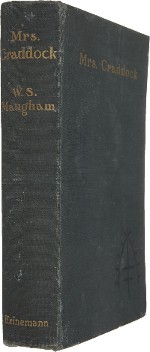
Mrs Craddock is a novel by William Somerset Maugham first published in 1902.

Bertha Benz was a German automotive pioneer. She was the business partner, investor and wife of automobile inventor Carl Benz. On 5 August 1888, she was the first person to drive an internal-combustion-engined automobile over a long distance, field testing the Benz Patent-Motorwagen, inventing brake lining and solving several practical issues during the journey of 105 km. In doing so, she brought the Patent-Motorwagen worldwide attention and got their company its first sales. Bertha Benz was not allowed to study in the Grand Duchy of Baden, and her financial and practical engineering contributions have long been overlooked until the 21st century.

The House of Mirth is a novel by American author Edith Wharton, published on 14 October 1905. It tells the story of Lily Bart, a well-born but impoverished woman belonging to New York City's high society in the 1890s. The House of Mirth traces Lily's slow two-year social descent from privilege to a lonely existence on the margins of society. In the words of one scholar, Wharton uses Lily as an attack on "an irresponsible, grasping and morally corrupt upper class."

The Cricket on the Hearth: A Fairy Tale of Home is a novella by Charles Dickens, published by Bradbury and Evans, and released 20 December 1845 with illustrations by Daniel Maclise, John Leech, Richard Doyle, Clarkson Stanfield and Edwin Henry Landseer. Dickens began writing the book around 17 October 1845 and finished it by 1 December. Like all of Dickens's Christmas books, it was published in book form, not as a serial.

Rachel Elise Blanchard is a Canadian actress. Her television roles include Nancy in the British sitcom Peep Show, Emma in the American comedy-drama series You Me Her, and Susannah in the American romantic drama series The Summer I Turned Pretty.

Jane Eyre is a 1996 romantic drama film adaptation of Charlotte Brontë's 1847 novel Jane Eyre. This Hollywood version, directed by Franco Zeffirelli, is similar to the original novel, although it compresses and eliminates most of the plot in the last quarter of the book to condense it into a two-hour film.

William Davis Garwood, Jr. was an American stage and film actor and director of the early silent film era in the 1910s.

Sweet and Low is a 1914 American silent short drama film starring William Garwood, Harry von Meter, and Vivian Rich, directed by Sydney Ayres, and released by Mutual Film Corporation on October 28, 1914. The film is based upon the 1850 poem Lullaby/Sweet and Low by Alfred, Lord Tennyson.
A Man's Way is a 1914 American silent short film directed by Sydney Ayres, starring William Garwood, Charlotte Burton and Louise Lester.
The Legend Beautiful is a 1915 American silent short drama film directed by Tom Ricketts. It stars William Garwood in the lead role with Perry Banks and Jack Richardson.

A Magdalene of the Hills is a 1917 American silent drama film directed by John W. Noble and starring William Garwood as Eric Southward, Mabel Taliaferro, and Frank Montgomery.

María Isabel is a Mexican telenovela produced by Carla Estrada for Televisa. It aired on Canal de las Estrellas from August 4, 1997 to February 6, 1998. María Isabel, is one of the few telenovelas that focuses on the life of an indigenous female protagonist and her community. The story was written by Yolanda Vargas Dulché and adapted by René Muñoz.
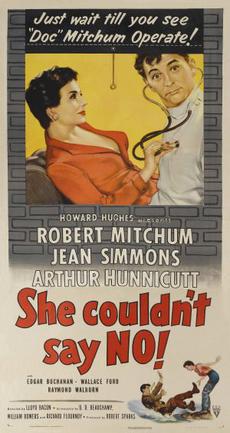
She Couldn't Say No is a 1954 American rural comedy film starring Robert Mitchum, Jean Simmons and Arthur Hunnicutt. It was the last film in the long directing career of Lloyd Bacon to be released.

Lummox is a 1930 American pre-Code sound film directed by Herbert Brenon and starring Winifred Westover. It was released through United Artists, and based on a 1923 novel by Fannie Hurst.
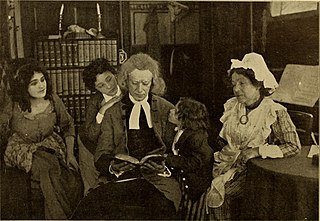
The Vicar Of Wakefield is a 1910 American silent short drama produced by the Thanhouser Company. The film was adapted from Oliver Goldsmith's 1766 novel The Vicar of Wakefield, but covers only part of the plot and deviates significantly from the book to allow the story to be told within the confines of a single reel of film.
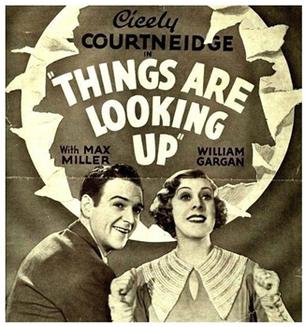
Things Are Looking Up is a 1935 British musical comedy film directed by Albert de Courville, produced by Michael Balcon for Gaumont British and starring Cicely Courtneidge, Max Miller and William Gargan. It was made at Islington Studios by British Gaumont, an affiliate of Gainsborough Pictures. The film's sets were designed by Alex Vetchinsky. The film was distributed by Gaumont British Distributors.
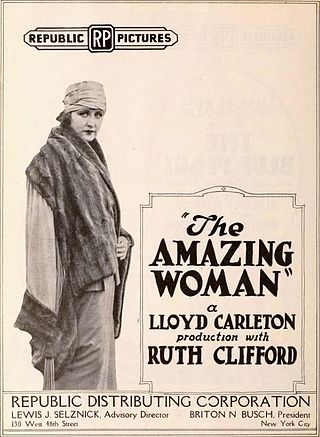
The Amazing Woman is a 1920 American silent drama film directed by John G. Adolfi and starring Ed Coxen and Ruth Clifford. It was released by the Republic Distributing Company.
Alice Blanchard Coleman was an American missionary society leader. She served as president of the Woman's American Baptist Home Mission Society and of the Council of Women for Home Missions (1908-16). Coleman was a trustee of Hartshorn Memorial College, Richmond, Virginia; Spelman Seminary, Atlanta, Georgia; and the New England Baptist Hospital, Boston. Writing as "Mrs. George W. Coleman", she made at least two contributions to periodical literature, "The Women's Congress of Missions", 1915, and "Recent developments in Mormonism", 1918. All of Coleman's life was spent in the old South End of Boston.















